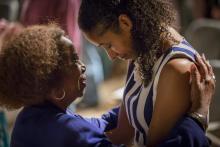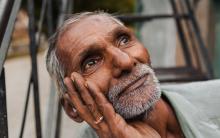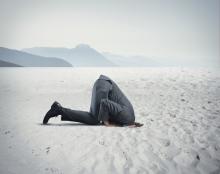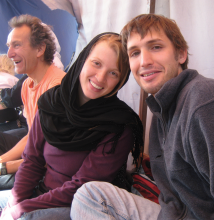Listening

Jim turned to me and said: “We’re greedy — seeking a second blessing.”
I smiled wryly: “This is my third.”

Listening to faces is hard work and has to be developed slowly over time. We live in a world that teaches us to speak twice as much as we listen, or to speak without listening at all. Yet, over time, listening to faces will grow the most important thing we can have in our hearts — deep empathy for each person we encounter every day.

Our initial vision included a basic goal of raising awareness and seeking to coordinate efforts for a unified response that would comprehensively address this form of modern-day slavery through prevention, awareness, action, and aftercare. But as our awareness efforts soon led many trafficking survivors to us, statistics and stories were replaced with personal, local faces that would need our help and in turn, would change our lives.
Interacting with trafficking survivors is a cross-cultural experience. Many of their stories are riddled with addiction, abuse, neglect, out-of-home placement, loss, rejection, and suffering. (And this does not even begin to address the culture of the commercial sex industry.) The language of “the life,” the rules of “the game”, and the many nuances of a relationship with a trafficker — whether known as daddy, boyfriend, boss, abuser, or lover — are only a few of the cultural differences for a woman coming out of the commercial sex industry.
As I sit with a woman who has secrets, stories, and experiences that are much different than my own, what can I offer? The world views her as dirty and as choosing this lifestyle. Others view her as to be pitied and a cause to be rescued. What does she need? What do we need to understand about women who have a history of prostitution or sex trafficking?
Recently I asked another woman this question. Separated from her trafficker for only two months, she had a fresh understanding.

Secular and religious therapists will all say the same thing — in times of suffering, people want to be heard when they cry out. We don’t have to worry about saying the right things or solving their problems. In fact, imposing our words and answers upon them often just gets in the way of their healing.
But the corollary to being heard is to talk — to talk about our emotions and our pain. This is where our culture has problems. We’re taught to not be a “burden” on others. Few of us want to admit to ourselves or to others that we have pain and that we are vulnerable. We’d much rather handle it ourselves, put on a tough exterior, and bury our pain deep within.
But that doesn’t lead to healing. Rather, it leads to more harm, as our bottled up emotions explode during times of stress. Controlling our emotions by bottling them up never works in the long term. When we us that method, we soon discover that we don’t control our emotions — our emotions control us.
The Shema calls us into a different way of life. It invites us to listen to the pain within ourselves and within our neighbors. In doing so, we find healing. And we find very presence of God.

One question I would ask a blue whale, if I could summon it from the depths of the ocean, would be, "Is it your giant heart that makes your kind the most peaceful and intelligent creatures on Earth?"
I often wonder about the link between the heart and kindness and intelligence. "Cogit ergo sum (I think therefore I am)," wrote René Descartes, and we live in a time where the sum of all of life is the mind, the value of all of life is the ability to be right and to be smarter than anyone else.
But what of "sentimus ergo sumus (we feel therefore we are)?” Is the sum of all of life really empathy, the practice of placing ourselves in the shoes of fellow human beings and walking around in those shoes until we can feel life as they feel it?
"If we value the growth of our hearts most of all, could we be more like you?," I would ask my giant, gentle friend.

“The reason I speak to them in parables is that ‘seeing they do not perceive, and hearing they do not listen, nor do they understand.’ With them indeed is fulfilled the prophecy of Isaiah that says: ‘You will indeed listen, but never understand, and you will indeed look, but never perceive. For this people’s heart has grown dull, and their ears are hard of hearing, and they have shut their eyes” (Matthew 13:11-15)
Humans shut their eyes to truth.
This week, the Intergovernmental Panel on Climate Change released the final installment of its three-part synthesis report on climate change. According to Rajendra Pachauri, the chairperson of the IPCC, this report is the “strongest, most robust, and most comprehensive analysis” to come out of the IPCC, which has been tracking climate change since 1988. Yet, there are still some who are hard of hearing.
The data that lies within the report is nothing completely new: climate change is happening, humans are responsible for climate change, and fossil fuels are severely damaging our levels of CO2. So, what is different about the newest installment of the IPCC report?
The emergence of one word: irreversible.

I went to the mecca of evangelicalism for college — beautiful campus in the suburbs of Chicago, where I received a scholarship from none other than the Pope of Evangelicalism, Billy Graham, for my work in street evangelism. As in, speaking to random strangers on the street in order to convert them to Christianity. Post graduation, I became a missionary, the Protestant equivalent of achieving sainthood.
I look back on that girl on fire and marvel at her earnest faith. If I could, I would reach back and massage the tense knots out of her high-strung shoulders, weary from carrying the weight of her neighbors’ eternal destinies. I would wistfully explain to her that the first person she tried to witness to, that gentle, drunken, homeless woman named Kathy, needed more than my rehearsed Roman Road to salvation. Then I would break the Temporal Prime Directive and reveal to her that one day she would become more interested in being evangelized than evangelizing.
The truth is, I’m just better at being evangelized. It’s probably how I was so easily converted at the tender age of 12. The young Christian is expected to learn how to share their testimony: their story of how God changes your life. By the time I was in my twenties, I had given my testimony a bajillion times.
But my own story often bored me.

Bio: Kelly and Peter Shenk Koontz spent the last three years serving in Kabul, Afghanistan, through a Mennonite Central Committee partner.
Website: MCC.org
1. What work were you doing in Afghanistan?
We worked with a Mennonite Central Committee (MCC) partner in Kabul as Peacebuilding Project Managers. Our job was to integrate peacebuilding within different sectors of the partner organization, including adult education, community development, and many others. Day-to-day, this primarily meant developing curriculum and planning and conducting trainings for a variety of contexts—including rural community development teams and university students in Kabul.

I am waiting for the music to return — the sonorous graces of laughter and kitchen clinking, of bird call on the hillside.
I am waiting for the music to return — the precarious arrangement of hope and memory that uplifts and guides.
I am waiting for the music to return — the band, the orchestra, the seisiún, the jam, the people who make and craft sound.
Instead, I am stranded in an eschatological posture like pause on my mp3 player. The Wifi Spirit does not respond and even if I could connect, the playlist I have randomized is sore lacking. I miss the people who make these sounds. I miss their voices.

The story of Pentecost always begins with a sound; the gathering of people and a sound. So often we focus on what is being said at the time in the story and ignore all the listening that takes place.
First, there's a sound.
Second, people hear the sound.
An encounter with the Holy Spirit is predicated on a sound and listening.
I wonder what Peter was thinking that day…with all that noise.
When I read this account from Acts, it’s pretty clear that Peter’s first thought was, “Oh no! Everyone is going to think we’re drunk and it’s only 9:00 in the morning!”
The story of Pentecost is often told as if the most important thing that happened was the speaking in tongues...that people were empowered to speak. Indeed, it’s important. No doubt.
But first, first, they heard something. They listened.

SINCE WE NOW know the federal government has been monitoring our every move for years—recording our telephone calls, reading our emails, trying to friend us on Facebook (“you have 295,984,457 mutual friends!”)—I wanted to clarify a few personal remarks that may have been misconstrued by NSA computers; computers which, I might add, are doing a heckuva job.
When I emailed a friend that I thought I “killed” at a recent gathering, I meant that I was particularly amusing that evening. I was not bragging about some heinous crime, which I would never commit anyway because, frankly, that’s not where the laughs are.
But “killed” looks bad in cyberspace, even though it’s something comedians want to do, as opposed to “bombed,” which is the opposite of “killed,” although NSA computers probably recognize a certain similarity between the two and automatically alert law enforcement officials. But again, the word “bombed” is a comedy concept meaning, variously, “wishing you were dead as an audience sits silently in judgment,” or for me, who entertains mainly in the homes of friends, “wishing you were dead, because people are laughing about you in the kitchen.”
But living in a free society means we shouldn’t have to watch what we say to avoid the unwanted curiosity of federal authorities. Heck, I get into enough trouble just trying to cheer up taciturn gatherings. (“Hey, is this a party or a funeral, hah hah?! What? Oh, sorry, I didn’t notice the flowers. Yes, he’ll be missed.”) On second thought, maybe a few days of secret CIA interrogation might do me some good. (“Were you under instructions from al Qaeda when you embarrassed your host by juggling the dinner rolls? Are there other social events you plan to terrorize or disrupt in the near future?”)
DURING THE BALKAN war of the early ’90s, I traveled twice to Bosnia and Croatia. I visited middle-class women whose husbands and sons had been brutally killed. I visited a refugee center filled with people who had lost everything and were at the mercy of any country that would take them in. I visited school children suffering from post-traumatic stress after seeing their parents killed by enemy shells that landed in their homes.
I walked through the rubble of Mostar, where the Friendship Bridge—a massive stone structure named in honor of the many ethnic groups that had crossed it for four centuries—had been bombed and destroyed. In city after city, I saw the destruction of architecture, art, museums—a violent erasure of the cultures that had thrived there.
It was the first time I had seen war up close, and I was shocked by what human beings do to each other.
While I traveled in the Balkans, another war was waged in Rwanda by Hutus against Tutsis—what we now refer to as the Rwandan genocide. Since 2009 I’ve traveled twice to the Democratic Republic of Congo, where the ethnic battles forged in Rwanda crossed borders and continue to this day. As usual in war, civilians pay the highest price. Subsistence farmers in small villages want only to live in peace, tend their crops, and feed their families. Instead, their crops are burned, wives and daughters are raped, and many become slave labor in Congolese mines that provide minerals for our cell phones and wealth for the violent criminals who control the mines.

A FEW YEARS back, Sojourners editor-in-chief Jim Wallis and I did a talk together at Northwestern University. After the event, the line to see Jim was dozens of people long. They wanted him to sign their books, to offer encouragement on their new social justice projects, to meet their kids, to give pastoral advice on a problem they were having. Jim talked to each and every one of them, some for several minutes. It delayed our dinner by at least an hour.
As we were finally sitting down in the restaurant and tucking in to our salads, I asked Jim why he stayed for so long. Why not do what so many other public figures do—leave right after your part of the show is over?
“I am a preacher and a pastor,” he answered. “An important part of my vocation is spending loving time with individuals. The period right after a public talk is an excellent opportunity to do that.”
“Plus,” he added, with a twinkle in his eye, “listening to other people’s stories may be the best part of this work.”
I just hit the 10-year mark of running Interfaith Youth Core, and the 15-year point of my first involvement with interfaith work. I haven’t logged as many miles or given as many speeches as Jim, but my schedule tends in a similar direction. The image of him talking to all those young people after that event at Northwestern sticks in my mind every time I board an early flight or prepare for a day of workshops followed by a late-night keynote.

The impact of Citizens United v. Federal Election Commission (2010) is experienced with increased intensity as we approach Election Day. Since the U.S. Supreme Court ruled that corporations and unions have a First Amendment right to independent political expenditures, certain portions of the Bipartisan Campaign Reform Act were reversed.
As a result, the voices surrounding political campaigns have risen in strength and size. And so, while a variety of viewpoints exist on the consequences of Citizens United, most agree that it has dramatically altered the culture of U.S. politics, and has thus sparked major discussion on the reach and limits of freedom of speech.
Due to the ramifications of Citizens United, we should indeed recognize and critique the role that freedom of speech holds within a mature democracy. However, as we focus on free speech, the time has come to also consider the contributions of its equally important companion, the responsibility to listen. In other words, as we ponder the primary ingredients of a healthy society, the delicate balance between freedom of speech and the responsibility to listen should be held as a critical priority.

If I hadn’t been so concerned about what I was going to say to the vet when the receptionist answered the phone, I would have heard the receptionist tell me loud and clear that I was through to a dental practice.
I hadn’t listened. In not listening I got everything I said wrong.
In the business I am in, of ministry and pastoral care, listening is such an important thing. I can prepare all the fancy theology and exegesis imaginable but if I don’t listen I might be getting it all wrong and embarrassing myself in the process.